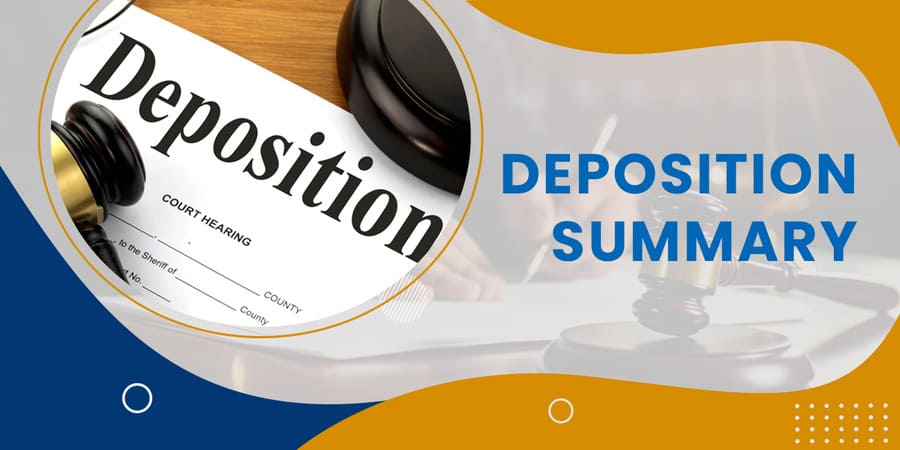Currently Empty: $0.00

Why an Accurate Deposition Summary Can Save You Time and Legal Costs
A deposition summary is one of those behind-the-scenes legal tools that can make or break a case—literally.
It’s not flashy, and most people outside the legal world barely know it exists.
But ask any seasoned paralegal or trial attorney, and they’ll tell you this slimmed-down version of a deposition transcript can be a lifesaver when deadlines loom.
A Simple Tool With Powerful Impact
The first time I had to work on a deposition summary, I underestimated it.
The transcript was 300 pages.
My task?
Get it down to ten pages without missing key facts.
What I didn’t realize then was just how much strategy goes into summarizing hours of testimony.
You’re not just copying lines word-for-word.
You’re analyzing tone, context, relevance, contradictions—every piece matters.
And when you’re on a time crunch, the quality of that summary can directly impact how efficiently the legal team prepares for trial.
Real Life: When a Summary Saved the Day
Back in 2021, I assisted in a wrongful termination case.
We had five days until mediation.
One deposition ran over five hours—filled with technical jargon and emotional testimony.
We didn’t have time to comb through the full transcript.
But the summary?
It highlighted the exact moment when the witness contradicted earlier statements from discovery.
That changed everything.
The attorney shifted his approach in mediation based on those two paragraphs.
Result?
The case settled—favorably.
And fast.
That’s when I understood: an accurate, well-structured summary is not just paperwork—it’s leverage.
Common Pitfalls to Avoid
There’s an art to getting it right, and just as many ways to get it wrong.
Over-summarizing is a common trap.
You skip too much, and critical testimony gets lost.
On the other hand, if you just paraphrase every single line, you’ve defeated the purpose—it’s no longer a “summary.”
Then there’s the bias issue.
Newer paralegals sometimes include only what they think matters.
But that’s risky.
A good summary offers the facts, not opinions.
If you’re new to this or refining your process, here’s a great resource on deposition summary best practices that outlines what to avoid and how to sharpen your technique.
What Goes Into a Solid Summary?
A useful deposition summary has structure.
Most use a chronological or topic-based format.
Personally, I prefer the topic-based approach for complex cases—it helps isolate issues faster.
You start by listing headings: employment history, discrimination claims, medical leave, performance reviews.
Under each, you plug in only the relevant testimony.
Short. Clear. Precise.
Dates, names, exhibits—those must be accurate.
Context also matters.
If a witness says, “I was told by my manager,” that line alone can suggest hearsay unless clarified.
So part of summarizing is not just reducing volume but flagging what needs follow-up or legal interpretation.
It’s About Time… Literally
Here’s a little math.
Let’s say a deposition lasts four hours.
That’s around 120 pages typed.
Now multiply that by four witnesses.
You’re looking at nearly 500 pages.
No one on a trial team has time to read every word again the week before court.
That’s why the summary is gold.
It turns five hours of testimony into five minutes of decision-making.
I once watched a trial attorney flip through a binder of summaries during closing argument prep.
He didn’t touch the transcripts.
Didn’t need to.
His entire case narrative was in those summaries—each annotated, flagged, and linked to exhibits.
That’s the kind of prep that wins cases.
Tools Help—but People Matter More
Yes, there are AI tools for generating summaries now.
And some do a decent job at pulling keywords or quotes.
But legal depositions aren’t just data—they’re stories, emotions, hesitations, contradictions.
Machines miss those.
Human reviewers pick up on tone.
When a witness pauses before answering a question about safety violations?
That pause may not be in the transcript—but if noted in the summary, it raises a red flag.
So while tools help speed things up, never remove the human from the loop.
Final Thoughts: Accuracy Equals Advantage
An accurate deposition summary gives your legal team something far more valuable than words—it gives them clarity.
It makes the messy manageable.
It cuts prep time.
It highlights risks.
It even boosts confidence before court.
And in high-stakes litigation, confidence backed by facts is a serious edge.
So whether you’re a litigator, a paralegal, or a case manager—mastering the art of summarizing depositions might just be one of the most underrated ways to gain legal leverage.
Because sometimes, it’s not the loudest voice in the courtroom that wins—it’s the one who’s the most prepared.

